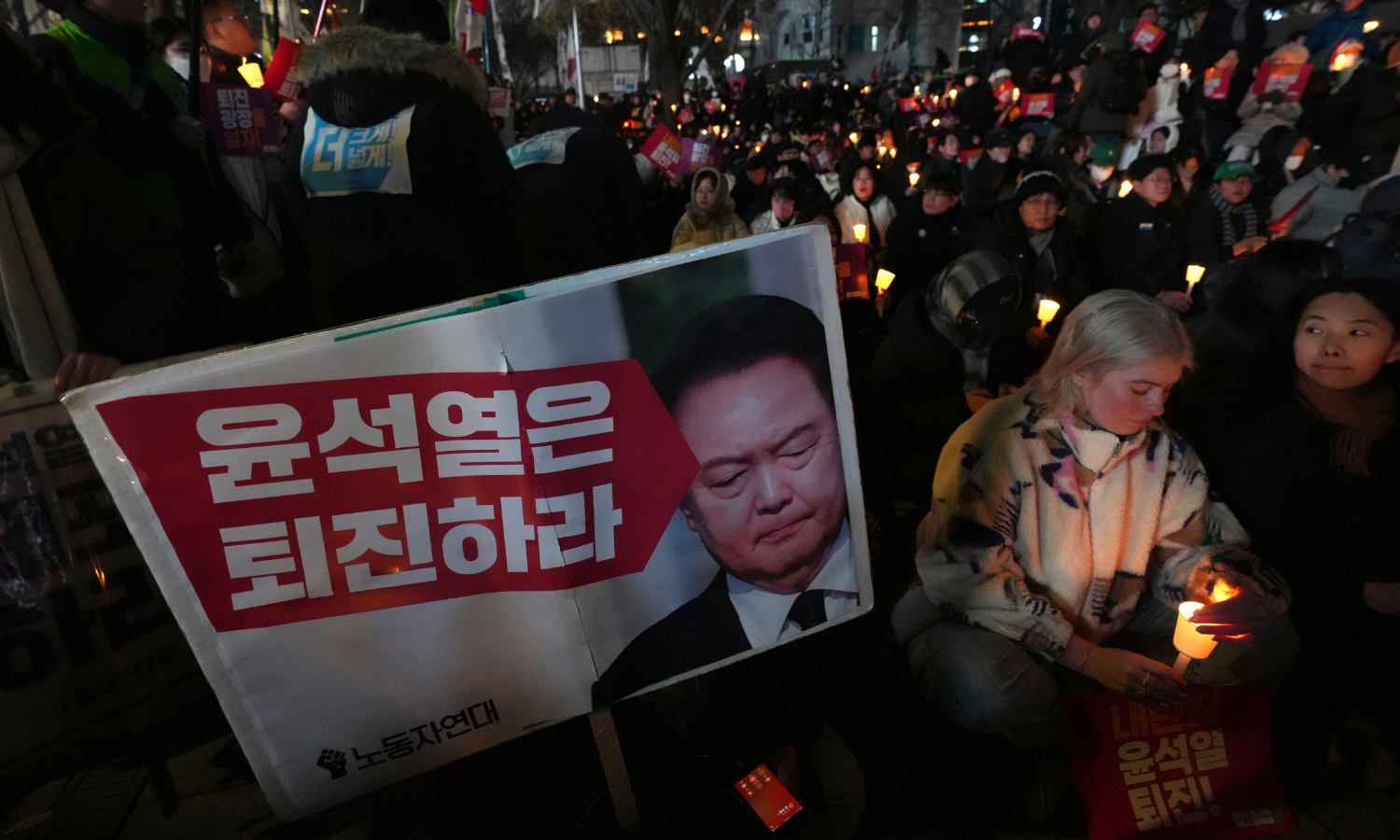
Tokyo: South Korea’s President Yoon Suk Yeol is facing possible impeachment for sending heavily armed soldiers into Seoul’s streets with a baffling declaration of martial law that reminded many of the country’s past military-backed dictatorships.
Lawmakers began the impeachment proceedings against Yoon just hours after parliament unanimously voted to cancel martial law, forcing the president to lift his order about six hours after it began. The vote could come as early as Friday and would need support by two-thirds of the National Assembly to advance to the Constitutional Court, which would decide whether to remove him from office.
Here’s what to know about the situation:
What is martial law?
South Korea’s constitution gives the president the power to use the military to keep order in “wartime, war-like situations or other comparable national emergency states.” Imposing martial law can include things like suspending civil rights such as the freedom of the press and assembly and temporarily limiting the powers of the courts and government agencies.
The constitution also gives the National Assembly power to lift the declaration with a majority vote. Lawmakers rushed to the building as soon as they heard of Yoon’s declaration late Tuesday. Some climbed the walls to evade the military cordon so they could assemble a quorum. Their vote to lift the order was 190-0 including 18 members of Yoon’s party.
The impeachment motion alleges Yoon imposed martial law far beyond his legitimate powers and in a situation that did not meet the constitutional standard of a severe crisis. The constitution also doesn’t allow a president to use the military to suspend parliament. The motion argues that suspending political party activities and deploying troops to seal the National Assembly amounted to rebellion.
Yoon blamed an ‘anti-state’ plot but details are vague
In Yoon’s announcement late Tuesday, he vowed to eliminate “anti-state” forces he said were plotting rebellion and accused the main opposition parties of supporting the country’s rival, North Korea.
Yoon gave no direct evidence when he raised the specter of North Korea as a destabilizing force. Yoon has long maintained that a hard line against the North is the only way to stop Pyongyang from following through on its nuclear threats against Seoul.
Yoon has struggled to get his agenda through an opposition-dominated parliament while facing corruption scandals involving him and his wife.
Will Yoon be impeached?
The motion to impeach Yoon can be put to a vote between Friday and Sunday. A new motion can be submitted later if the current one fails or expires. Support from two-thirds of the single-chamber National Assembly, or 200 of its 300 members, would be required for Yoon to be impeached. Opposition parties have 192 seats and the motion may need support from Yoon’s conservative People Power Party.
The PPP opposes the motion, but it’s unclear if members will vote against it or if the party will boycott, which would change how many votes are needed.
If they impeach him, Yoon would be suspended until the Constitutional Court decides whether to remove him from office. Prime Minister Han Duck-soo, who holds the No. 2 position in the South Korean government, would take over presidential responsibilities.
The Constitutional Court currently has three vacancies due to retirements, and six votes are required to remove the president from office. The Democratic Party is expected to speed up the process of exercising its rights to recommend two of the three new justices.
Yoon has been struggling politically
There were quick claims that the martial law declaration was linked to Yoon’s political struggles.
He has had little success in getting his policies adopted by a parliament that has been controlled by the opposition since he took over in 2022.
Conservatives have said the opposition moves are political revenge for investigations into Democratic Party leader Lee Jae-myung, who is seen as the favorite for the next presidential election in 2027.
Just this month, Yoon denied wrongdoing in an influence-peddling scandal involving him and his wife. The claims have battered his approval ratings and fueled attacks by his rivals.
The scandal centers on claims that Yoon and First Lady Kim Keon Hee exerted inappropriate influence on the conservative ruling People Power Party to pick a certain candidate to run for a parliamentary by-election in 2022 at the request of Myung Tae-kyun, an election broker and founder of a polling agency who conducted free opinion surveys for Yoon before he became president.
Yoon has said he did nothing inappropriate.
Martial law has a dark history in South Korea
During the dictatorships that emerged as South Korea rebuilt from the 1950-53 Korean War, leaders occasionally proclaimed martial law that allowed them to station combat soldiers, tanks, and armored vehicles on streets or in public places to prevent anti-government demonstrations.
Army Gen. Park Chung-hee led several thousand troops into Seoul in the early hours of May 16, 1961, in the country’s first coup. He led South Korea for nearly 20 years and proclaimed martial law several times to stop protests and jail critics before he was assassinated by his spy chief in 1979.
Less than two months after Park’s death, Maj. Gen. Chun Doo-hwan led tanks and troops into Seoul in December 1979 in the country’s second coup. The next year, he orchestrated a brutal military crackdown on a pro-democracy uprising in the southern city of Gwangju, killing at least 200 people.
In the summer of 1987, massive street protests forced Chun’s government to accept direct presidential elections. His army buddy Roh Tae-woo, who had joined Chun’s 1979 coup, won the election held later in 1987 thanks largely to divided votes among liberal opposition candidates.
